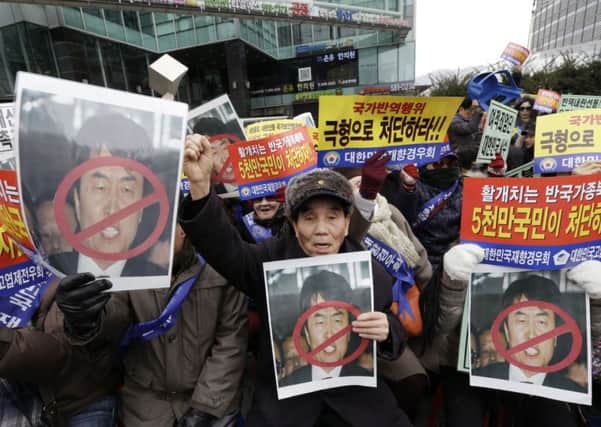South Korean court upholds sentence for rebel MP


In confirming a nine-year prison sentence for former Unified Progressive Party MP Lee Seok-ki for inciting rebellion and praising the North, the court also upheld shorter terms for six of Lee’s colleagues in their final appeals trial, Chief Justice Yang Sung-tae said.
The ruling follows several other decisions that have drawn sharp criticism from liberals who say the conservative government of President Park Geun-hye is clamping down on free speech.
Advertisement
Hide AdAdvertisement
Hide AdSouth Korean officials earlier this month arrested leftist activist Hwang Sun, a former party colleague of Lee, for praising the North, which is illegal in the South. That arrest came just days after an American was deported because of similar accusations.
The supreme court’s judgment “exacerbates the alarming trend of tightening restrictions on the right to freedom of expression in South Korea”, Roseann Rife, director of research for Amnesty International in East Asia, said in a statement.
In December, South Korea’s constitutional court ordered the breakup of Lee’s party and removed him and four other MPs from the National Assembly.
Lee was arrested in September 2013, a week after South Korea’s spy agency raided his office and a day after the assembly voted to lift his legislative immunity against arrest. Prosecutors accused Lee of holding a secret meeting with 130 followers in May 2013 where he and the other defendants talked about launching strikes on national infrastructure in the event of war.
The meeting took place at a time of high tension on the divided Korean peninsula following the North’s third nuclear test in February of that year and its subsequent threats of nuclear strikes against Seoul and Washington.
Before his arrest, Lee denied the accusations against him. He accused the spy agency of fabricating the charges to divert public attention from an investigation into suspicions that its agents engaged in illegal online campaigning to help Mr Park win the presidential election in December 2012.
Lawyers for Lee and his colleagues argued in court that it was unclear that they really intended to plot a rebellion. They also questioned whether the recordings, computer files, USB drives and smartphone records obtained by prosecutors were reliable.
The Suwon district court in February last year sentenced Lee to 12 years in prison on charges of conspiring and inciting rebellion and violating the national security law. But the Seoul high court in August reduced his prison term to nine years after acquitting him of the conspiracy charges.
Advertisement
Hide AdAdvertisement
Hide AdSouth Korea’s highest courts continue to cite the North Korean security threat “in mechanically applying laws that restrict the freedoms of speech, association, publication and media, without seriously considering the impact on citizens’ basic rights”, said Lim Ji-bong, a law professor at Sogang University in Seoul.
The national security law was passed in 1948 to combat Communist sympathisers and spies after the Korean peninsula was divided following World War II. The law is still viewed by some, including UN officials, as a tool used to silence critics.